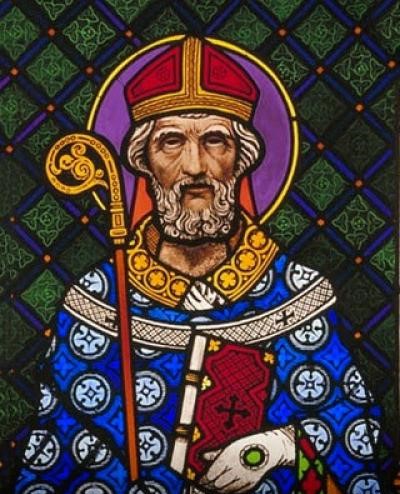
Saint of the Day for 16 March: St. Eribert of Cologne
St. Eribert of Cologne: Reforming Bishop and Patron of Peace
Name
St. Eribert of Cologne
Title
Bishop
Birth
c. 970, Worms, Germany
Death
1021, Cologne, Germany
Recurrence
16 March
Martyrology
2004 edition
Canonization
c. 1074, Rome, Pope Gregory VII
Prayer
O God, who hast given to thy people Saint Eribertus Bishop , by his help make us strong and persevering in the faith, to cooperate assiduously in the unity of the Church. Through our Lord Jesus Christ, your Son, who is God, and lives and reigns with you, in the unity of the Holy Spirit, for ever and ever. Amen
Roman Martyrology
In Cologne, Germany, St. Eribert, bishop, who, as chancellor of Emperor Otto III, elected against his will to the episcopal see, unceasingly enlightened the clergy and people by the example of his virtues, to which he exhorted in his preaching.
The Saint and Mission
Saint Heribert of Cologne, a 10th century reform bishop, embodies the essence of spiritual leadership that seeks to harmonize faith with the practical needs of the community. His life and ministry reflect a deep dedication to Christian mission, highlighting how spiritual leadership can positively influence society and promote peace and justice. Saint Eribert’s mission was characterized by a constant commitment to ecclesiastical reform and the promotion of peace. In an era marked by conflict and division, his work as bishop focused on strengthening church discipline, educating the clergy and supporting the poor. Eriberto demonstrated particular attention to social cohesion and conflict resolution, actively promoting reconciliation between the warring parties and trying to establish relationships based on mutual respect and Christian love. His approach to the episcopal mission reflected a holistic vision of faith, integrating spiritual care with social action. Eribert understood that the call to follow Christ implied a responsibility towards the well-being of the entire community, which went far beyond the simple administration of the sacraments. His ministry was therefore animated by a deep conviction that the Church should be a beacon of hope and an agent of change in society, working to alleviate suffering and promote peace. One of the most notable aspects of St. Eribert’s mission was his commitment to the poor and needy. His sensitivity to issues of social justice and his generosity in responding to the needs of the less fortunate demonstrated an authentic understanding of the Gospel as a message of universal love and solidarity. Eriberto worked to ensure that the Church was a place of welcome and support for all, especially those who were marginalized and forgotten by society. The life and mission of St. Heribert of Cologne offers us an inspiring example of how spiritual leadership can transform communities and build a more just and peaceful society. His legacy invites us to reflect on our role as Christians in today’s world, challenging us to live our faith in an active and committed way, working for peace, justice and the well-being of all. St. Heribert reminds us that Christian mission requires courage, compassion, and an unshakable trust in the transformative power of God’s love.
The Saint and Mercy
Saint Heribert of Cologne, through his episcopal ministry in the 10th century, embodied divine mercy in a time of great challenges, becoming a beacon of hope and spiritual guidance for his community. His life, marked by deep devotion and an unwavering commitment to justice and peace, reveals the importance of mercy as a fundamental principle of Christian leadership. At the heart of Saint Eribert’s mission lay the belief that mercy was not simply a passing emotion or an isolated gesture, but a constant attitude that must permeate all human relationships and the actions of the Church. This approach was manifested in his commitment to ecclesiastical reform, which aimed to renew the spiritual and moral life of the clergy and faithful, emphasizing the importance of compassion, forgiveness and care for the most vulnerable. Eriberto showed particular attention to the poor and needy, seeing the face of Christ in them and responding to their needs with generosity and dedication. His work to assist the less fortunate was rooted in a vision of the Church as a community of mercy, where each member is called to support the other in a virtuous circle of love and mutual service. St. Heribert’s ability to promote peace and reconciliation between conflicting factions also reflected his deep understanding of mercy as a force for healing and unity. By working tirelessly to mediate between opposing parties and to resolve disputes with fairness and justice, Eriberto demonstrated that mercy is fundamental to building a harmonious society and to overcoming divisions and misunderstandings. The life and work of St. Heribert of Cologne offers an inspiring model of how mercy can guide the mission of the Church in the world. His legacy invites us to rediscover mercy as the heart of the Gospel and as the foundation of all authentic Christian action. He reminds us that, even in the face of the most arduous challenges, we are called to be instruments of God’s mercy, working to bring light, hope and healing to the hearts of our communities. The testimony of Saint Eribert exhorts us to live with compassion, to seek justice and to promote peace, following in the footsteps of Christ, the face of the Father’s mercy.
Hagiography
When it was said that Eribert was consecrated Bishop of Cologne in 999 much had already been said. It was on the eve of that Thousand, which was announced to be full of fright, because of the believed end of the world. On that moment of universal panic much has been cast, as if the expectation of apocalyptic days had really paralyzed the life of the world. One need only recall Carducci’s words about ” Le turbe raccolte intorno a’ manieri feudali, accasciate e…
